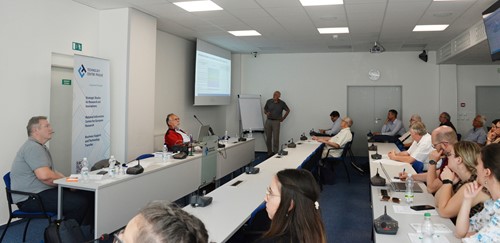Seminar Clean Water and Water Recycling occurred on 18 June 2024

Almost forty participants came to listen to the lectures of the seminar "Water Purity and its Recycling", which took place on 18 June 2024 at the premises of TC Prague.
This event was organized by the Czech Membrane Platform (CZEMP) in cooperation with the Technology Centre Prague within the MEMGREENTRANS project (Membranes in the Digital and Green Transformation of Industry, reg.no. CZ.01.01.01/07/23_010/0001224).
The workshop featured five interesting lectures dealing with water treatment and recycling. Ing. Jan Barton, CSc. presented the work process in the MEMGREENTRANS project within the expert team. The expert team is preparing the first version of the Action Plan (AP), which will be completed at the end of September this year. He presented the basic outline of the AP, which focuses on the current situation in the field of wastewater treatment in municipalities. The aim of the Action Plan is to present the outlook for wastewater treatment and recycling in the medium (2030) and long term (2045).
Doc. Ing. Jaroslav Raclavsky, Ph.D. from the Institute of Municipal Water Management at the Brno University of Technology, informed the attendees about the current state of legislation in the field of water management.
The lecture by Ing. Jaroslav Lva, Ph.D. from the company ASIO TEC s.r.o., was focused on the possibilities of implementing membrane technologies in the treatment of industrial and municipal wastewater or the treatment of swimming pool water. He pointed out the necessity of thorough familiarization with the problems in each individual case so that the design of the treatment technology would be successful in the long term. Among other things, he stated that it is necessary to ensure that the operation of the membrane technology is at a level that guarantees the smooth operation of the machinery.
The next speaker was Petr Pracna from TC Praha, who informed the participants about the possibilities of preparing applications for the Horizon Europe programme in the areas of water treatment and purification. Horizon Europe offers very interesting financial opportunities, but at the same time requires high quality of the submitted projects.
At the end of the workshop, RN Dr Josef K. Fuksa, CSc. from the Research Institute of Water Management, spoke. His lecture focused on the content of micropollutants in water and the status of their possible removal from water. In principle, micropollutants are not monitored or removed today. In the case of pharmaceuticals, there are already studies that balance the consumption of pharmaceuticals in the population and their concentration in watercourses. It is in the area of pharmaceuticals that significant changes are expected in the requirements for the removal of pharmaceutical residues in wastewater. This will mean further investment in existing wastewater treatment plants to meet these new requirements. Based on the responses from the audience, it was clear that this talk, in particular, has significantly expanded interest in previously unstudied micropollutants in wastewater.
Since the theme of the workshop attracted the attention of so many people, it is up to us, the organizers of this event, to prepare the next edition of this workshop in 2025 to make it even better.

